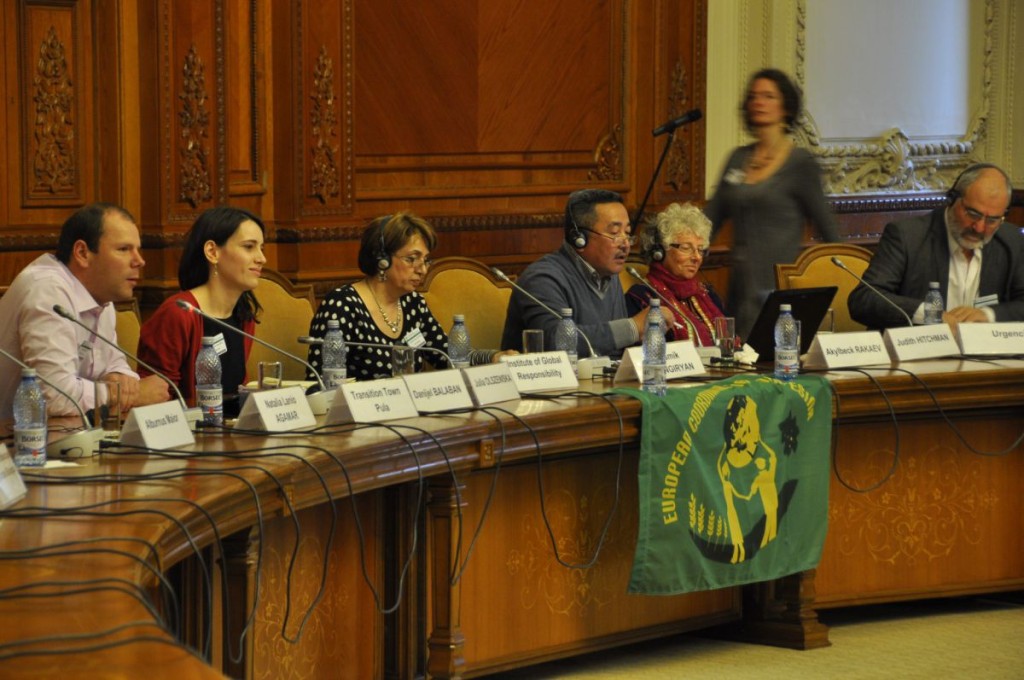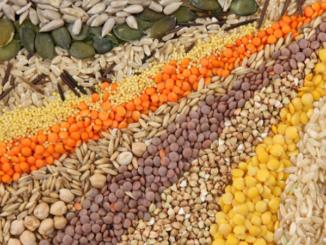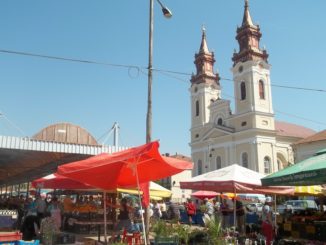This is the second of a four part series of posts from the FAO’s Regional Conference for Europe in Romania. For all posts, see here.
Guest Post by Danijel Balaban, Judith Hitchman, Julia Olszewska, Mihaela Vetan.

The FAO consultation with NGOs and CSOs for Europe and Central Asia took place in Bucharest in Romania on 29th and 30th of March. There were approximately 40 funded CSO participants, representing the various constituencies: small-scale farmers, pastoralists and herders, agricultural workers, consumers and fishers from each of the sub-regions: Western and Eastern Europe and Central Asia. About 20 additional non-funded participants took part as observers. It is important to realise that in all cases these constituencies’ representatives are active food sovereignty networks that defend overall interests as well as the more specific interests of their respective constituencies.
Urgenci, the global Community Supported Agriculture (CSA) network is now generally recognised as the leading consumer constituency network in the food sovereignty movement. Consumers in this context are not passive actors, but are deeply committed to building economically sustainable solidarity-based access to healthy local food options together with producers. We are strongly represented in both Western and Eastern Europe, and the delegation was made up of four members: Judith Hitchman, who leads the advocacy team within Urgenci, Mihaela Vetan, founding member and coordinator of the Romanian ASAT (CSA) movement, Danijel Balaban from Croatia, whose numerous hats include CSA farming and Transition Towns in Pula, and Julia Olszewska from the Polish CSA movement. Sergiu Florean, also from the Romanian network, although not an official participant was the official CSO photographer for the event.
The very dense programme of 6 thematic discussion sessions included subjects such as: access to land and seeds, food losses and waste, right to food, responsible agricultural investments (rai), connecting smallholders to the market, the role of public institutions in providing access to healthy food, water management, and social protection of workers involved in agriculture.
The final document outlines recommendations for the priorities for FAO’s activities in the region, advocating the Right to Food approach as a basis for reviewing food security policies in the region. It also strongly stressed the role of the peasant agriculture as a safeguard for healthy and just food systems, especially through producers’ right to the land and seeds, and advocating for the rights of the agricultural workers and women.
The key objectives of the consultation meeting were to learn from one another, and to allow the drafting committee to build the final declaration that would reflect the most fundamental concerns of civil society, so that these could be brought forward as civil society interventions in the following days’ meetings with States.
Drafting of the declaration was an inclusive process led and facilitated by the drafting committee. The canvas of the declaration was based on summaries of all the sessions held during the consultation, and the final text was discussed and approved by all the participants in the final session.
A unique feature of the reformed Committee for World Food Security and Nutrition (CFS), where civil society works on detailed input on various aspects of governance and food-related subjects, the Food and Agriculture Organization (FAO) also holds regional consultations with civil society every two years. It is important to understand that although the CFS is directly attached to the United Nations Economic and Social Commission, (ECOSOC), and answers to the Secretary General of the United Nations, that policy documents voted by States in the CFS subsequently become FAO policy.
FAO also has its own process of regional consultation with Non-Governmental Organizations (NGOs) and Civil Society Organizations (CSOs), as well as its own meetings of States that take policy decisions at regional level. This has recently been strengthened by the FAO Council decision to work more closely with CSOs. The input provided by CSOs at this level is particularly important, as it is the level at which regional specificities can genuinely be taken on board and impact future policy-making. It is also a moment when CSO organisations can gather to discuss and share their regional and sub-regional priorities and strengthen the alliances that they will also be able to use to lobby States in a coherent manner at regional level, as well as working with FAO country offices.
A detailed agenda and relevant documents are available at here.





1 Trackback / Pingback
Comments are closed.